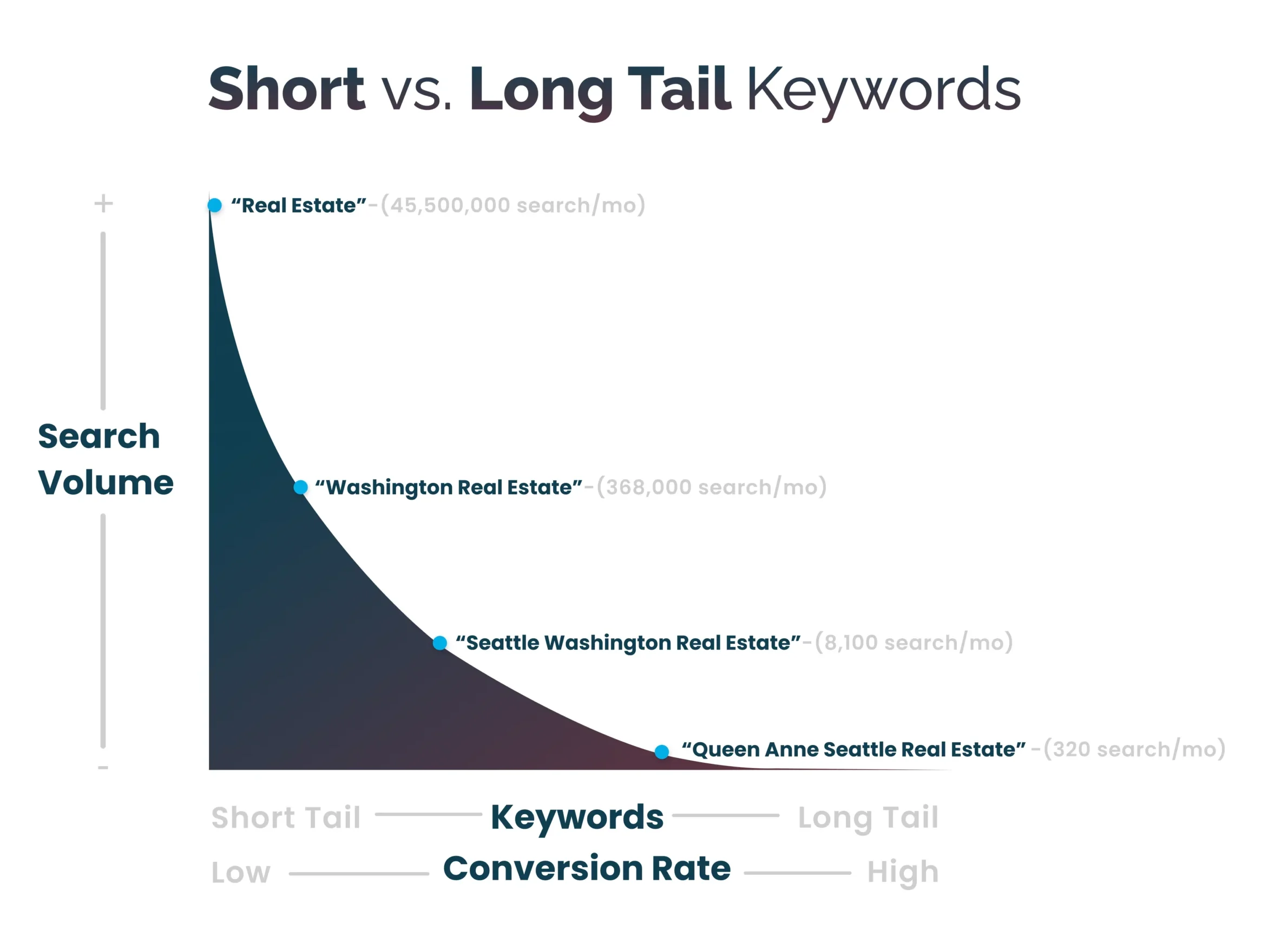Chapter 3
KEYWORD RESEARCH FOR ATTORNEYS

What Are Keywords?
Keywords are the specific words or phrases people type into search engines when looking for information, services, or businesses
Keywords are like bridges between what users search for and your content. They’re crucial for making sure that when someone searches for a specific topic, your relevant content appears in the search results. Essentially, keywords are the key words linking what people seek with the available content on the internet. Their significance lies in determining whether your content appears on the Search Engine Results Pages (SERPs).
Welcome to the strategic world of keyword research, a fundamental aspect of SEO that can significantly enhance your law firm’s online visibility. In this chapter, we’ll dissect the essence of keywords, unravel the importance of keyword research, and provide a step-by-step guide tailored for attorneys. Let’s embark on this journey to unlock the potential of keywords in amplifying your online presence.
There are two main types of keywords to consider :
Short Tail Keywords:
Short tail keywords are typically broad, one to three-word phrases that generate high searches. They’re like the main arteries of search traffic but also highly competitive. For law firms, short-tail keywords might include terms like “personal injury lawyer” or “divorce attorney.”
Long-Tail Keywords:
Long tail keywords are longer and more specific keyword phrases with lower search volumes. Despite their lower search volume, they can attract more targeted and qualified traffic to your website. They’re like your firm’s specialized services, addressing potential clients’ specific needs and questions. Examples include “do I need a personal injury lawyer?” or “how to file for divorce in California.”

What is Keyword Research, and why Does it Matter?
Keyword research for law firms is the strategic process of discovering the words and phrases potential clients use when searching for your business. It’s about understanding the language of your audience and aligning your content with their needs and queries.
Keyword research is crucial because it guides content creation, website optimization, and overall online visibility.
By identifying relevant keywords, you can tailor your law firm’s content to align with the language and queries of potential clients. This strategic use of keywords enhances the chance of your content appearing at the top of search engine results.
Keyword Research Terms Explained
Let’s break down some of the critical terms you’ll encounter in keyword research:
- Volume: refers to the number of searches a particular keyword receives within a specific timeframe. High-volume keywords are searched more frequently, but they’re often more competitive.
- Keyword Difficulty (KD): KD is a metric that estimates how hard it would be to rank for a particular keyword based on the competition. The higher the KD, the more effort and resources it might take to compete. Learn more about Smerush keyword difficulty scale here
- Intent: Understanding the intent behind a keyword is crucial. It’s about knowing whether a user wants to buy, learn, or find a service. Aligning your content with the correct intent increases the chances of conversion and engagement.
Keyword Research for Lawyers - Where to Start
Legal keyword research lays the groundwork for your law firm’s digital strategy. It’s about understanding the language of your potential clients and aligning your online presence with their needs. Let’s dive into where to start and how to harness the power of keywords to enhance your law firm’s online visibility.
#1 Conduct Competitor Analysis
Begin by analyzing your competitors. Tools like Google Keyword Planner and SEMrush can illuminate the specific keywords your rivals are targeting. This insight lets you identify what’s working for them and spot opportunities to differentiate your strategy. Understanding your competition is not about imitation but about finding your unique advantage.
Here is a quick video from SEMrush on How to Find New Ranking Opportunities From a Competitor’s Keywords
#2 Create a List of Seed Keywords
Seed keywords are the bedrock of your law firm keyword research. These are broad terms closely related to your services and practice areas. Seed keywords are the starting point for more complex and targeted keywords to grow. They help you tap into the core topics relevant to your firm and clients.
For a personal injury attorney, seed keywords would include:
- Personal Injury
- Injury lawyer
- Car Accident
- Injury Settlement
#3 Find Related Terms
Expand your keyword universe by exploring terms related to your seed keywords. This exploration helps you discover a more comprehensive range of phrases and questions potential clients might use. It’s about painting a fuller picture of the language surrounding your services and anticipating the needs of your audience.
Using SEMrush Keyword Magic Tool, input your short tail keyword or seed keyword. Here we are using the query “personal injury”.
You can find terms relevant to your seed keyword by clicking “Related”. You can then sort by “Volume”, showing your related keywords with the highest monthly search volume.
As you can see below, “Personal Injury Lawyer” populates as the highest volume keyword related to our seed keyword “personal injury”

#4 Find What People are Searching for
Dive deep into the actual queries people type into search engines. Long-tail keywords, which are often more specific, longer phrases, and less competitive keywords, are precious. They usually have a more apparent intent and can drive more qualified traffic to your site. Understanding these queries means you’re better positioned to answer your potential clients’ exact questions.
Rather than viewing all related terms to your seed keyword, you can sort by “Questions” as shown below. This allows you to find long-tail keywords for content pieces such as blogs and FAQs.

For more information on how to use SEMrush Keyword Magic Tool, watch their quick tutorial here
Understanding Client Queries
Pay close attention to the frequently asked questions by your clients. Legal forums like Avvo, Justia, and Lawyers.com are treasure troves of real-world inquiries and concerns. By tuning into these conversations, you can align your content with the issues and questions your potential clients face.

For example, Lawyers.com has a free Q&A section that can be filtered by practice area or a general list of the questions that have been answered most recently.
#5 Integrate Location Specific Keywords
Now that we’ve covered the foundational aspects of keyword research, let’s turn our attention to a crucial step that can truly set you apart in the digital marketing landscape: integrating location-specific keywords.
A law firm’s clients are usually local, and using terms related to your area can help with local SEO. Location specific keywords can significantly boost your firms visibility among potential clients seeking legal services nearby.
Start by brainstorming location modifiers that align with your target market. Consider including neighborhood names, city districts, or even county-specific terms.
For example, instead of just targeting “personal injury lawyer,” you can optimize your content for “personal injury lawyer in Chicago.” This strategic approach not only helps you connect with clients in your area but also enhances your chances of ranking higher in local search results.
On-Page Optimization with Keywords
Once you’ve identified your optimal keywords, it’s time to put them to work through on-page optimization. This process involves strategically incorporating keywords into your website’s content and meta tags to improve visibility and relevance. Chapter 4 gives a more in-depth exploration of on and off page optimization, for now we will highlight the key elements of On-Page Optimization (OPO) concerning keywords.
- Title Tags & Meta Descriptions: Include your primary keywords in both your title tag and meta description. They’re the first thing a user sees in the search results, so make them count.
- Headings & Subheadings: Use your keywords in titles and subheadings to structure your content and signal its relevance to search engines and users.
- Content: Naturally integrate keywords into your content. Remember, the goal is readability and relevance – avoid overstuffing.
- URLs: Include keywords where possible to enhance understandability and relevance.
- Alt Text for Images: Describe your images using relevant keywords to improve visibility and accessibility.
Keyword Research Tools for Attorneys
Several tools can aid your keyword research:
- Google Keyword Planner: A free tool that provides insights into search volume and competition.
- Ahrefs: Offers detailed keyword data, including volume, KD, and related terms.
- Semrush: A comprehensive tool that provides keyword suggestions, competitive analysis, and more.
Conclusion: The Path Forward with Keywords
Keyword research is an ongoing process, not a one-time job. Stay alert to how clients search and changes in the legal landscape. As you refine your strategy, remember the main goal is to genuinely connect with your audience. Use your chosen keywords to bridge the gap between your expertise and what your clients are looking for. With a careful approach to keyword research, you’ll improve your online presence. Keep your strategy focused, adaptable, and informed, and see your digital footprint grow among the clients you want to reach.
LAW FIRM SEO GUIDE

“Hiring Everspark to do the comprehensive SEO audit of my website was money very well spent. They are thorough, knowledgeable and approachable.”
-Mike Rafi
READY TO PARTNER WITH ONE OF THE BEST DIGITAL MARKETING AGENCIES?